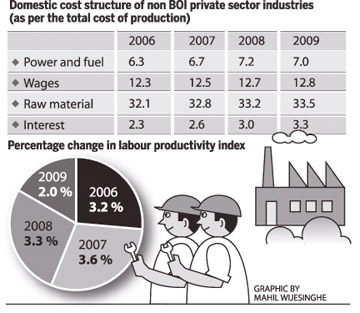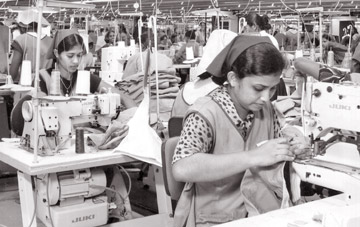|
To achieve govt's goals:
Consistent industrial development policy vital - CNCI
How can the macroeconomic goals of the government, double digit
economic growth and double the per capita GDP by 2015 be achieved? To
achieve these what are the sectoral growth targets? Are important
questions in policy dialogues, today.
|

Sunil Liyanage |

Kumara Kandalama |
Economy analysts believe that the industrial sector in the country
has a huge untapped potential and therefore has a greater role in the
new chapter of the Sri Lankan economy.
Industrial sector growth was slow and it grew at around 6 percent in
the recent past.
The political and security situation in the country contributed to
this situation. Despite various incentives offered adequate FDIs did not
flow into the country as the risk was high.
Regional expansion of industries did not take place as around one
third of the country was under civil war.
Turbulent times
Poor infrastructure, high cost of power, lack of skilled labour
contributed negatively to the industrial sector development plans of the
government.
The apparel industry underwent a turbulent time after the phase out
of MFA in 2005 and a large number of small and medium manufactures were
wiped out.
 Only organisations that could adjust to the new situation survived.
Most of the garment factories set up in rural areas in the 1980s were
closed down. The end of the GSP+ trade concession has posed another
challenge for the apparel industry. Only organisations that could adjust to the new situation survived.
Most of the garment factories set up in rural areas in the 1980s were
closed down. The end of the GSP+ trade concession has posed another
challenge for the apparel industry.
Coconut based industries were affected with large scale contraction
of coconut cultivation in the country, as the best coconut cultivated
lands are used for other purposes. Mineral and other natural resources
in the North and Eastern provinces couldn't be used in industrial
production and large scale industries such as cement, chemicals, sugar,
were abandoned.
Most of these negative factors have now been removed and new
opportunities are opened for industrialists.
In 1999 a national policy for industrial development was formulated
with the patronage of the then Minister of Industries the late C. V.
Gunarathne.
After a comprehensive study conducted by a team of experts led by
Prof. Lakdas Fernando of the Moratuwa university, 12 thrust industries
were identified for development for over 12 years. Plastics was one of
them. UNIDO and JBIC funded this study and huge money was spent.
Ironically a few weeks after the report was launched, the then
environment minister banned the plastic industry and said that the
government would not issue permits to start new plastic industries.
This simple example shows the lack of vision in policy makers for
industrial development.
The Ceylon National Chamber of Industries (CNCI) expressed its view
on how the industrial sector can contribute to achieve the macroeconomic
goals of the government. We discussed issues with the Chairman of the
CNCI, Sunil Liyanage and the Secretary General, Kumara Kandalama.
|

Kumara Kandalama |
Liyanage said that these goals are realistic under the present
conducive political economic environment, if the government set business
friendly policies in place for the businesses to move forward and the
economy to reach its true potential.
Then Industrial sector that contributes 29 percent of the economy
today has a greater potential to expand.
For that, the sector needs a consistent national industrial
development policy from the government.
To ensure safety of the investments consistent fiscal policy is also
needed. Ad hock and frequently changing government fiscal policies hurt
the sector and we expects the policies to be consistent for at least 5-6
years.
It is risky to start business relying on government policy because
sometimes it is totally reversed in the next budget.
In setting up industries, investors plan to recover the investment
over a period of time and sudden policy changes ruin business plans.
Policy direction
Liyanage said that the coming budget will give policy direction to
achieve government goals and therefore expect a positive and business
friendly budget. CNCI has also submitted its proposals to the
Presidential Tax Commission and Liyanage said that industrialists from
large scale to SMEs expect a consistent fiscal policy at least for the
next five to six years.
Multiplicity of the present tax system is costly to businesses as
well as the tax department.
Today there are around 60 taxes and levies. Complexity in the tax
system leads to defaults. Taxes are defaulted not because businesses
want to evade taxes, but since is complex. This multiplicity of the tax
system has also affected the country's competitive index or ease of
doing business.
This gives a negative signal to foreign investors. Complexity in
customs duties and procedure is another issue where mainly industries
that use imported raw materials are affected. CNCI submitted proposals
to address these issues. We said that we can pay one or two taxes and
not many. Specially this is important to take the SMEs into the tax net,
he said.
Liyanage said that to accelerate economic growth the country will
have to invest more. Since our domestic investments are not sufficient
the country should attract more foreign investments, especially FDIs.
The FDI inflow is not yet satisfactory.
Budgetary allocations
On the other hand, it is essential to invest in technology and R&D at
sectoral level. This also needs budgetary allocations and encouragement.
The Industrial sector in Sri Lanka is no more enjoying the comparative
advantage in low cost labour.
We have to compete in the global markets with regional countries that
have gained from advanced technology and high productivity.
Our technological advancement should be on par with them.
Another issue the industrial sector faces is the lack of a skilled
work force both at managerial level and blue collar level.
The government's policy on education has recognised this need yet in
the upcoming budget the government has reduced the expenditure for
education.
Liyanage said that CNCI has proposed to set up a joint consultation
body in the Ministry of Industries with members of the Chamber.
This kind of mechanism is important to ensure consistent policies and
if the policies are changing then the industrialists can represent their
views.
The ministry should also have a separate statistical unit that
maintains an up to date data base relevant to the industrial sector.
Lack of statistics has created issues in policy making and strategic
planning.
To increase industrial sector contribution to the GDP it is important
to increase value addition in all sectors. Instead of exporting raw
material in bulk we should start value added industries.
In some industries we have to go for collaboration with foreign
investments. Especially, to acquire technology and skills.
Government support is needed for backward integration of industries
to increase their value addition, especially tax relief for importing
machinery and technology.
According to the Labour Productivity Index, labour productivity in
the industrial sector is increasing marginally.
It was 3.6 percent increase in 2007 and only a 3.3 percent increase
in 2008.
Liyanage said that the Northern province is developing rapidly and
SMEs in the region will restart soon.
They need government assistance in skills development, infrastructure
and providing sales and marketing facilities.
Kumara Kandalama said that CNCI, the pioneering business chamber in
the country has been closely working with the government in industrial
sector policy making.
In the 1970s ministers such as N.M. Perera, T.B. Subasinghe and
Maithripala Senanayake worked very closely with the Chamber and the
industrial sector policies formulated at that time were successful.
After the opening up of the economy in 1977 the industrial sector of
the country grew rapidly and diversified. It extended to regions as
well.
Quality improvement
The sector has reached a high standard and industrial culture has
changed. Efficiency and quality improvement are the key aspects we have
to consider to achieve higher growth in this sector, he said.
Kandalama said that CNCI has already started rehabilitation of SMEs
in the Eastern province.
The handloom industry in the Eastern province was very successful
prior to the conflict.
There were over 5,000 handloom centres. In some centres around 2500
employees had worked. We have set up two clusters covering Kathankudi,
Batticaloa and Marandamunnai to assist those industrialists to restart
their industries, Kandalama said.
GW
|

